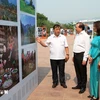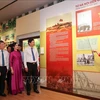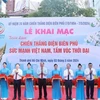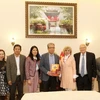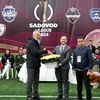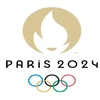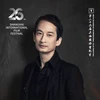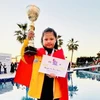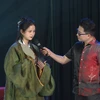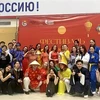One of the critical tasks of Vietnam linguistics is to ensure the clarity of the Vietnamese language and create the best conditions for it to fully develop.
This was the view presented by Nguyen Xuan Thang, Chairman of the Institute of Academic Science , at a recent meeting of local and international linguistics scholars in Hanoi .
Thang also said more attention should be paid to preserving the diversity of ethnic minorities' languages and enabling them to be used both orally and in the written form.
Hundreds of Vietnamese and international scholars attended the talks, held to discuss 30 years of development in national linguistics.
The conference received 277 studies from scholars, including 40 from those in Australia , America , China and other places. The others were from Vietnamese scholars.
The studies were on fundamental and current issues in socio-linguistics; applied linguistics; dialectology, history of the Vietnamese language, language and culture; phonics, lexis, grammar; and ethnic languages in Vietnam .
Professor Bui Manh Hung from the Ho Chi Minh City University of Education said language and literature training in Vietnam is not yet effective as it lacks theoretical foundations and fails to integrate international trends. The curriculum designer should take into account what students will gain after each class".
Vietnam has set out good measures in mother-tongue education but more needs to be put in place, said PhD Quang Dai Can, University of Hawaii , while he gave a talk on mother tongue education. Bilingual education is a highly effective method to strengthen the use of both the native and national languages amongst ethnic minorities, according to Can.
The bilingual education programme, which has proven to be cheap, should be implemented not only in elementary schools as is being done, but also in secondary and high schools. Teacher training, curriculum design and pilot schemes are critically important and should be considered before the bilingual programme is put into practice, said Can.
It is also essential for the government to carry out more practical steps in ethnic language education so that the ethnic people recognise the government's efforts to preserve their native languages and that Vietnam is a country of language diversity. Success in ethnic minority education will help the country to develop as well as to preserve a live language source for the world, he concluded.
Professor Dinh Lu Giang said the ethnic response to dual-language education should be taken into consideration, as in some areas locals want to be fluent in Vietnamese to make them more employable and their native language is less important. "While knowing the national language is essential, it is also very important to make locals fully aware of the importance of learning their mother tongue. More attention needs to be paid to this problem," Giang said.
Speaking on the preservation and development of the Sila language, spoken in mountainous regions to the north, Thuy Ngoan, a television broadcaster in Lai Chau province said the Sila language is being on the verge of disappearing as very few people use it nowadays, even leaders of villages speak Vietnamese.
The Sila language can be used to communicate verbally but does not have a writing system. In light of this, the National Tourism Authority recorded folk music in an effort to preserve the villagers' traditional rituals. The Radio and Television Station of Lai Chau province plans to make documentary about the local culture in their mother tongue. "More support from the authorities is needed to preserve the Sila language," Ngoan said.
Addressing issues in the teaching of culture in language education, Ma Tin Cho Mar from the University of Malaysia concluded “We as teachers need to help students to build up their understanding of the culture in the targeted language to improve their learning skills”. The better they understand the culture of a language, the more their understanding of the language itself will improve. Reading texts should be aligned with the understanding of a language's culture, he said.
Speaking on Vietnamese language and culture education in universities in the Republic of Korea, Professor Song Jung Nam from the Hankuk University of Foreign Studies said in the context of growing cooperation between Vietnam and the RoK, it is required that Vietnamese language and culture education is more widespread and improved.
To meet the increasing demand, student and lecturer exchange programmes should be increased between Vietnamese language and culture education centres in Vietnam and the RoK.
Cooperation in designing the curriculum for Koreans studying Vietnamese at different levels should be made and a standard assessment of Vietnamese as a second language needs to be created and used in Vietnam and foreign countries including the RoK, he said.
The government, universities, enterprises and social cultural organisations should have funds supporting Vietnamese language training in foreign countries in different forms of research funding, scholarship, he added.
The conference, which was held by the Linguistics Institute, was the second of its kind with the participation of about 600 people, following the first one in 2013.-VNA




